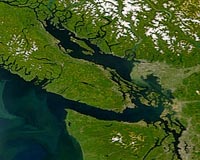| . |  |
. |
Tromso, Norway (AFP) Nov 11, 2009 As the world climate summit closes in, scientists monitoring the impact of global warming in the far north have grown frustrated by public apathy and disbelief about the extent of the problem. "Measuring ice thickness is extremely difficult," says Edmond Hansen, an arctic change researcher at the Norwegian Polar Institute meticulously charting the effects of climate change, ahead of the December 7-18 Copenhagen summit. "Satellites can't do it for the moment. You have to drill into the ice and use electro-magnetic techniques," he says at his office in the fjords of Tromso, a university town on the same latitude as Siberia. He has just got back from his annual trip, closer to the North Pole, with new measurements to complete graphs plotting the change wrought by greenhouse gases. For the past 11 years, Hansen has been positioning himself at the same spot on Fram Strait, between Greenland and the Spitzberg (administered by Norway). He measures currents, temperatures and the salinity of the slowly warming Arctic waters which promise to bring a king tide of climate change to Northern Europe. That's millions of euros for every expedition, to pay a staff of 30, an ice-breaker with a laboratory and a helicopter. Plus a continuous fight to get fresh cash to continue research, which takes up most of Hansen's energy. "It takes years getting a graph out" from which to draw scientific conclusions, he points out with some bitterness. "I'm frustrated by the lack of willingness to understand. The general problem in the field is the lack of respect for the knowledge of climate scientists." Jan-Gunnar Winther, director of the Norwegian Polar Institute, regrets that half of the population of Norway "doesn't believe in climate change," compared to 97 percent of scientists. "That worries me because the general public has a connection to politicians. They are voters," he said. "We need to act and it's the politicians' responsibility to act." "Arctic glaciers are melting, over 10 years you can see the changes with your own eyes," but for the general public "it's mentally very difficult to understand," Winther concedes. And rich Norwegians don't want to change their comfortable way of life, like most people living in the Northern hemisphere. Recent scientific research seems however to point out that the future could be even bleaker than forecast. The Intergovernmental Panel on Climate Change (IPCC) -- whose report serves as a signpost for the UN talks in Copenhagen and brings together existing scientific data -- came out with its last benchmark report in 2007. The next updated version could include "worse numbers when it comes to global sea level," believes Jan-Gunnar Winther. A Danish researcher has, for example, just calculated that Greenland's melting ice will result in a 14-centimetre (5.5-inch) global sea rise by the end of the century, instead of the five centimetres (two-inches) included in the last IPCC report, he points out. But there is already "enough evidence and consequences that are so serious that politicians have enough information for decisions to be made", adds Winther. A month before the summit, scientists here were dubious about a deal. "I don't expect them to come up with a solution. It's really too complex", believes Edmond Hansen. In any case, Norwegian environmental groups will flood Copenhagen to push for concrete commitments. Orjan Holm, vice-president of the "Green warriors of Norway", plans to sail there on a giant catamaran decorated with killer whales. "Most people in Tromso would be glad to have milder winters," says the bearded Norwegian, proudly showing off his seal skin jacket. "But when they can't skate any more they will understand what's going on." Share This Article With Planet Earth
Related Links Beyond the Ice Age
 Canada, US state give name to new sea
Canada, US state give name to new seaVancouver, Canada (AFP) Oct 31, 2009 The Salish Sea may never appear on official navigation maps, but residents of western regions in the United States and Canada hope a new name will protect their shared coastal waters. A Washington State agency approved the new name Friday for the body of water off North America's west coast that includes Puget Sound, the Strait of Juan de Fuca, and Georgia Strait. The name is partly in ... read more |
|
| The content herein, unless otherwise known to be public domain, are Copyright 1995-2009 - SpaceDaily. AFP and UPI Wire Stories are copyright Agence France-Presse and United Press International. ESA Portal Reports are copyright European Space Agency. All NASA sourced material is public domain. Additional copyrights may apply in whole or part to other bona fide parties. Advertising does not imply endorsement,agreement or approval of any opinions, statements or information provided by SpaceDaily on any Web page published or hosted by SpaceDaily. Privacy Statement |